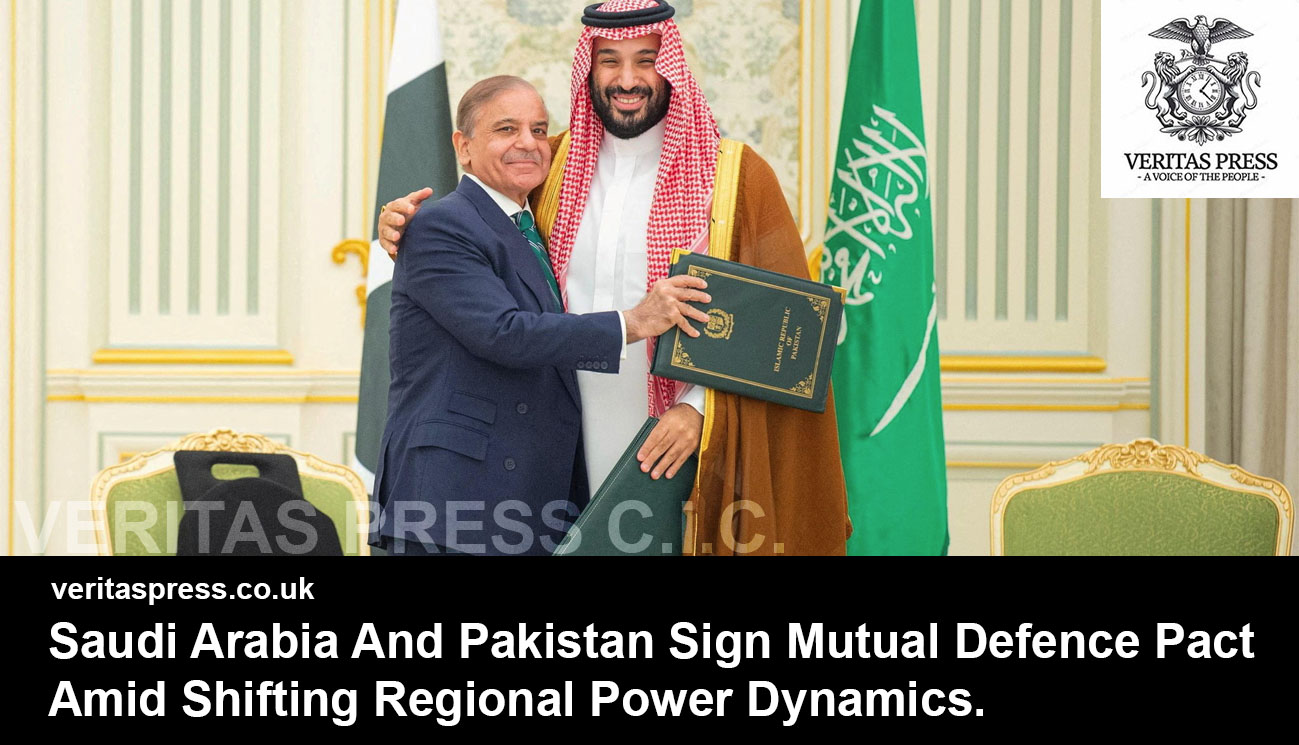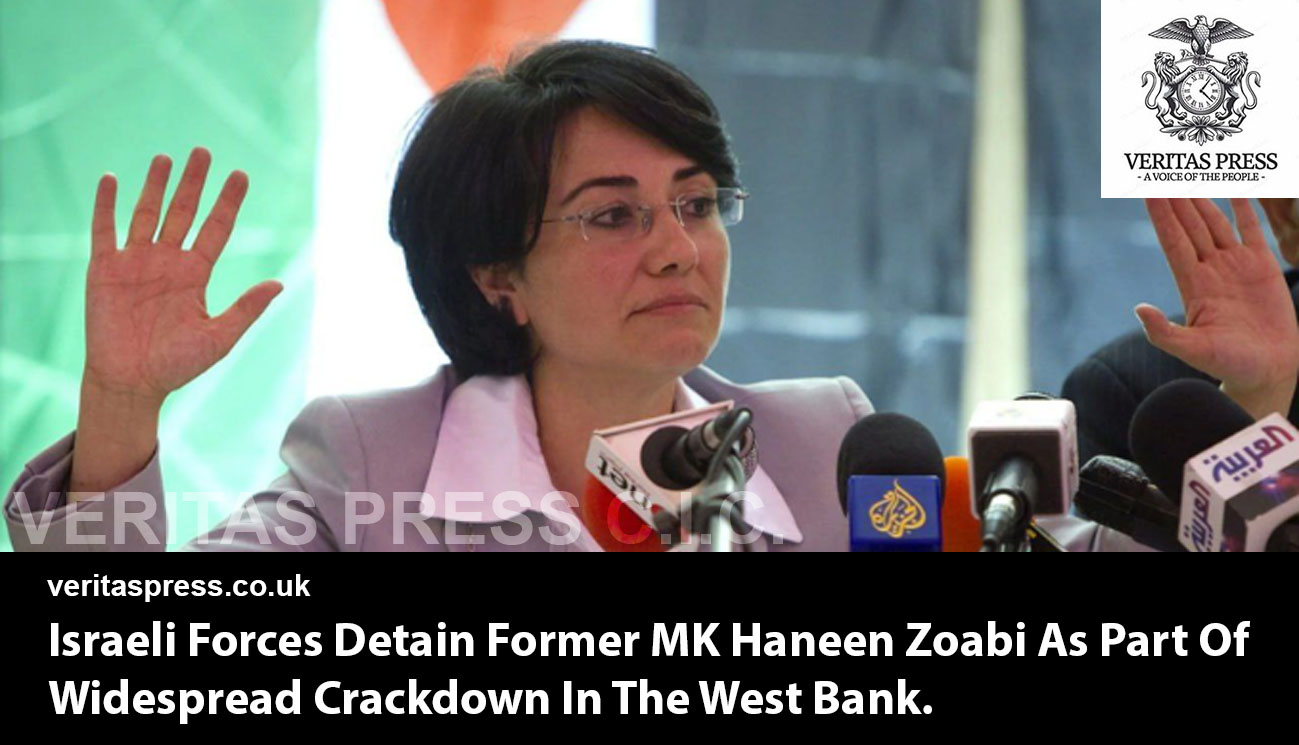The Deal Reflects The Gulf’s Anxieties As US Credibility Wanes After Israel’s Attack On Doha. But It Affects India, Too.
Saudi Arabia and nuclear-armed Pakistan have signed a sweeping mutual defence pact, cementing a decades-old security partnership at a moment of mounting volatility in the Middle East.
The agreement, signed in Riyadh on Wednesday by Crown Prince Mohammed bin Salman and Pakistani Prime Minister Shehbaz Sharif, commits both nations to treat any aggression against one as aggression against the other, a significant escalation of their long-standing but until now informal defence ties.
Pakistani state television broadcast images of the two leaders embracing, with Pakistan’s army chief, Field Marshal Asim Munir, widely regarded as the most powerful figure in the country, present at the ceremony. A statement from Islamabad described the deal as a commitment “to strengthen joint deterrence against any aggression” and to “develop aspects of defence cooperation between our two countries.”
A Break With The US Security Umbrella?
The pact comes as Gulf Arab monarchies grow increasingly sceptical of Washington’s willingness to act as their primary security guarantor. Those concerns have been magnified by Israel’s recent airstrikes in Doha, which attempted to assassinate Hamas political leaders during ceasefire negotiations brokered by Qatar.
The unprecedented Israeli strike on Qatari soil, the second attack on the Gulf state in less than a year following Iran’s earlier missile barrage, infuriated Arab capitals and exposed what many view as the erosion of US deterrence in the region.
“This agreement is a culmination of years of discussions,” a senior Saudi official told reporters, dismissing suggestions that the timing was purely reactionary. “This is not a response to specific countries or specific events but an institutionalisation of longstanding and deep cooperation between our two countries.”
“Washington is increasingly constrained, facing the growing perception among Gulf allies that US security guarantees are unreliable.”
The move also reflects a wider realisation among Gulf states that reassessing their dependence on US security guarantees and protection is increasingly unreliable and riddled with duplicity and double standards. Washington’s selective application of international law, exemplified by its unconditional backing of Israel even in the face of repeated violations, has highlighted the fragility of relying on Western powers for protection. The sole, unilateral power to veto in the UN Security Council, which the US wields consistently to shield Israel from accountability, further exposes the hypocrisy and imbalance of the current global order.
Towards a “Muslim NATO”?
The sense of betrayal has fuelled a growing discussion across the Muslim world about the urgent need for an indigenous security framework. For Saudi Arabia and its allies, the defence pact with Pakistan is not only a bilateral agreement but also a test case for a broader vision: the creation of a Muslim NATO-style body, capable of collective defence without reliance on Western powers.
The idea is not entirely new. In 2015, Riyadh launched the Islamic Military Counter Terrorism Coalition (IMCTC), a Saudi-led alliance of more than 40 Muslim-majority countries, though it was largely limited to counterterrorism coordination and lacked real teeth. Unlike that symbolic body, today’s calls are being framed against a backdrop of direct attacks on Gulf soil, growing fears of Israeli adventurism, and Iran’s expanding regional footprint.
“Arab and Muslim states are beginning to realise that their security cannot be subcontracted to Washington or Brussels,” said a former Gulf intelligence officer. “A Muslim NATO is no longer a slogan, it’s becoming a strategic necessity.”
Analysts note that Pakistan, with its nuclear arsenal, large standing army, and history of deploying troops to the Gulf, would be a natural cornerstone of such an alliance. Turkey, Qatar, and Egypt have all been floated as potential players in a more formalised military bloc, though political rivalries remain an obstacle. Still, the Saudi-Pakistani pact signals that the momentum for an Islamic alternative to NATO is building.
Nuclear Shadow:
The most striking element of the agreement is the potential nuclear dimension. While the Saudi official avoided directly confirming whether the pact would provide Riyadh with a Pakistani nuclear umbrella, he stressed that the “comprehensive defensive agreement… encompasses all military means.” Analysts say this could give Saudi Arabia, which does not possess nuclear weapons, a backdoor to nuclear deterrence at a time when Iran’s nuclear programme continues to advance unchecked.
“Even if it’s not written in black and white, the symbolism of this agreement is that Riyadh can call on Islamabad’s ultimate deterrent if needed,” said a Gulf-based defence analyst. “That possibility will not go unnoticed in Tehran, Tel Aviv, or Washington.”
Balancing India And Regional Fault Lines:
The Saudi official acknowledged the pact would require careful balancing given Pakistan’s long-standing rivalry with India, another nuclear-armed state with whom Riyadh has deepening ties. “Our relationship with India is more robust than it has ever been,” the official said. “We will continue to grow this relationship and seek to contribute to regional peace in whichever way we can.”
The statement reflects Riyadh’s broader strategic hedging: expanding security and economic ties with both India and Pakistan, while simultaneously pursuing pragmatic engagement with Iran and Israel, efforts that have been severely disrupted by the ongoing war in Gaza.
Strategic Shockwaves:
By formalising what had long been a tacit arrangement, Pakistan providing military manpower and expertise to the kingdom in return for financial support, the pact could upend the region’s strategic calculus. Saudi Arabia gains explicit backing from the only Muslim-majority nuclear power, while Pakistan secures renewed economic and political lifelines from one of its most important patrons.
But the timing also underscores the deepening sense of insecurity across the Gulf. The Gaza war has redrawn regional alignments, leaving Qatar, a key mediator and US ally, twice targeted in less than a year by hostile fire, once from Iran and now from Israel.
“Gulf states are watching their allies being struck, negotiations collapsing, and the US standing by,” said a regional diplomat. “The Saudis are signalling that they won’t leave their security to chance.”
Potential Regional Reactions:
Israel: Jerusalem is likely to view the pact as a long-term strategic threat. Analysts warn that the explicit backing of a nuclear-armed Pakistan could deter Israeli military adventurism in the Gulf while complicating its calculations on Gaza and Iran.
Iran: Tehran may see the agreement as a counterweight to its own regional ambitions, particularly given Saudi Arabia’s ongoing rivalry with Iran for influence in Yemen, Iraq, and the Gulf. Some analysts expect Iran to accelerate military readiness and deepen ties with proxies across the region in response.
United States: Washington’s position is under strain. The pact underscores the perception that US security guarantees are failing in the eyes of Gulf allies, forcing American policymakers to weigh whether to bolster military presence in the region or risk losing strategic influence to a Muslim-led security bloc. Some officials may privately view the deal as destabilising, while publicly reaffirming commitment to both Riyadh and Tel Aviv.
Geopolitical Implications:
The Saudi-Pakistan defence pact marks more than a bilateral security agreement; it signals a fundamental shift in Middle Eastern geopolitics. By formalising military cooperation with the only Muslim-majority nuclear power, Saudi Arabia is sending a clear message: reliance on the United States and the Western-led security order is no longer sufficient or reliable.
The combination of repeated Israeli strikes on Gulf soil, selective application of international law, and Washington’s consistent use of its UN Security Council veto to shield Israel has underscored the limits of Western protection. For Riyadh and other Gulf monarchies, these developments have made the idea of a Muslim NATO-style collective security framework not just desirable but increasingly urgent.
If expanded beyond Saudi-Pakistan cooperation, such an alliance could redefine power balances across the region. It would offer an alternative deterrence structure, potentially constraining Israel’s military actions, countering Iranian influence more collectively, and providing Gulf states with strategic autonomy independent of Washington.
Yet challenges remain. Internal rivalries among Muslim-majority states, economic pressures, and the complexity of nuclear considerations could complicate the formation of a cohesive bloc. Still, the pact illustrates a growing willingness among Gulf leaders to hedge against Western unreliability and assert their sovereignty in regional security matters.
Ultimately, this agreement reflects a broader realignment: the Middle East is entering a period where traditional alliances are being questioned, nuclear capabilities are increasingly central to strategic calculations, and the concept of collective Muslim security is moving from theory toward reality. How Israel, Iran, and the United States respond will likely determine whether this pact remains symbolic or evolves into a transformative force reshaping the region’s strategic landscape.






























Leave a Reply